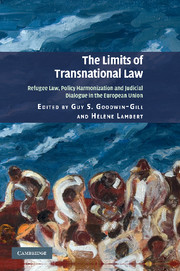 The Limits of Transnational Law
The Limits of Transnational Law Book contents
- Frontmatter
- Contents
- Notes on contributors and editors
- Acknowledgements
- Abbreviations
- 1 Transnational law, judges and refugees in the European Union
- 2 Where is the reference? On the limited role of transnational dialogue in Belgian refugee law
- 3 Transnational refugee law in the French courts: deliberate or compelled change in judicial attitudes?
- 4 The use of foreign asylum jurisprudence in the German administrative courts
- 5 The solipsistic legal monologue of Italian authorities
- 6 ‘Thou shalt not judge’ … Spanish judicial decision-making in asylum and the role of judges in interpreting the law
- 7 The British judiciary and the search for reciprocal relations with its continental partners
- 8 Speaking across borders: the limits and potential transnational dialogue on refugee law in Ireland
- 9 The absence of foreign law in Danish asylum decisions – quasi-judicial monologue with domestic policy focus?
- 10 Foreign law in Swedish judicial decision-making: playing a limited role in refugee law cases
- 11 The search for the one, true meaning …
- Bibliography
- Index
5 - The solipsistic legal monologue of Italian authorities
Published online by Cambridge University Press: 06 July 2010
- Frontmatter
- Contents
- Notes on contributors and editors
- Acknowledgements
- Abbreviations
- 1 Transnational law, judges and refugees in the European Union
- 2 Where is the reference? On the limited role of transnational dialogue in Belgian refugee law
- 3 Transnational refugee law in the French courts: deliberate or compelled change in judicial attitudes?
- 4 The use of foreign asylum jurisprudence in the German administrative courts
- 5 The solipsistic legal monologue of Italian authorities
- 6 ‘Thou shalt not judge’ … Spanish judicial decision-making in asylum and the role of judges in interpreting the law
- 7 The British judiciary and the search for reciprocal relations with its continental partners
- 8 Speaking across borders: the limits and potential transnational dialogue on refugee law in Ireland
- 9 The absence of foreign law in Danish asylum decisions – quasi-judicial monologue with domestic policy focus?
- 10 Foreign law in Swedish judicial decision-making: playing a limited role in refugee law cases
- 11 The search for the one, true meaning …
- Bibliography
- Index
Summary
This chapter discusses the lack of transnational legal activity between Italian authorities competent to make decisions on international protection and their European counterparts. It also explains some of the reasons for this lack of traffic in legal ideas. Initially, the chapter considers the general framework of Italian legal thinking as one of the best examples of ‘closed’ civil law systems. The development of the institutional framework of asylum and refugee law in Italy is then analysed with the aim of identifying further key ‘rational’ reasons for the absence of cross-European use of jurisprudence by the Italian courts. The chapter next considers the sparse quantitative data available as evidence of the lack of transnational legal activity in this area of the law, before providing some ‘cultural’ explanation for this lack based on interviews with key practitioners in the field.
A brief introduction to the Italian legal mind
Italy is quintessentially a civil law country, somewhat harmoniously situated in a theoretical middle ground between France and Germany, while resolutely aware of its own centuries-long legal tradition. On one hand, much doctrinal debt is owed by Italian legal science to these two countries. For instance, the theory of the negozio giuridico (that is, the general theoretical category to which inter alia contracts and unilateral acts both belong) is of German origin (Rechtsgeschäft).
- Type
- Chapter
- Information
- The Limits of Transnational LawRefugee Law, Policy Harmonization and Judicial Dialogue in the European Union, pp. 85 - 106Publisher: Cambridge University PressPrint publication year: 2010
